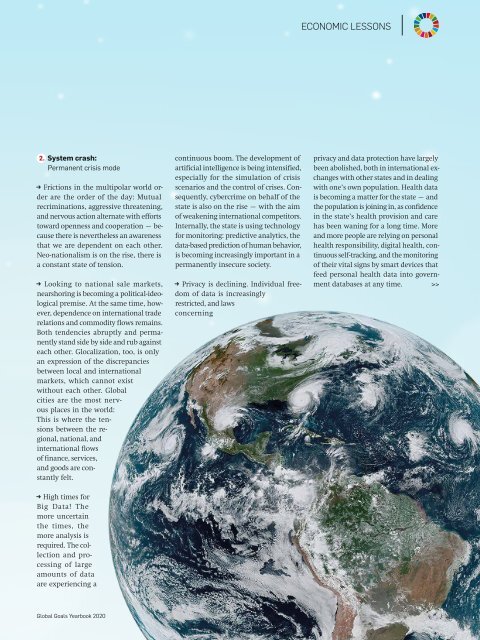Planet under Pressure
The 2020s are the make-or-break decade for Sustainability. But Covid-19 questions almost everything. How can we handle increasingly frequent shocks? What can a resilient society and economy that is in line with planetary boundaries look like? These and many other questions are discussed in the new 2020 edition of the Global Goals Yearbook titled “Planet under Pressure”. The Yearbook supports the UN Sustainable Development Goals and is one of the publications in strong international demand.
The 2020s are the make-or-break decade for Sustainability. But Covid-19 questions almost everything. How can we handle increasingly frequent shocks? What can a resilient society and economy that is in line with planetary boundaries look like? These and many other questions are discussed in the new 2020 edition of the Global Goals Yearbook titled “Planet under Pressure”. The Yearbook supports the UN Sustainable Development Goals and is one of the publications in strong international demand.
Create successful ePaper yourself
Turn your PDF publications into a flip-book with our unique Google optimized e-Paper software.
ECONOMIC LESSONS<br />
2. System crash:<br />
Permanent crisis mode<br />
→ Frictions in the multipolar world order<br />
are the order of the day: Mutual<br />
recriminations, aggressive threatening,<br />
and nervous action alternate with efforts<br />
toward openness and cooperation – because<br />
there is nevertheless an awareness<br />
that we are dependent on each other.<br />
Neo-nationalism is on the rise, there is<br />
a constant state of tension.<br />
→ Looking to national sale markets,<br />
nearshoring is becoming a political-ideological<br />
premise. At the same time, however,<br />
dependence on international trade<br />
relations and commodity flows remains.<br />
Both tendencies abruptly and permanently<br />
stand side by side and rub against<br />
each other. Glocalization, too, is only<br />
an expression of the discrepancies<br />
between local and international<br />
markets, which cannot exist<br />
without each other. Global<br />
cities are the most nervous<br />
places in the world:<br />
This is where the tensions<br />
between the regional,<br />
national, and<br />
international flows<br />
of finance, services,<br />
and goods are constantly<br />
felt.<br />
→ High times for<br />
Big Data! The<br />
more uncertain<br />
the times, the<br />
more analysis is<br />
required. The collection<br />
and processing<br />
of large<br />
amounts of data<br />
are experiencing a<br />
continuous boom. The development of<br />
artificial intelligence is being intensified,<br />
especially for the simulation of crisis<br />
scenarios and the control of crises. Consequently,<br />
cybercrime on behalf of the<br />
state is also on the rise – with the aim<br />
of weakening international competitors.<br />
Internally, the state is using technology<br />
for monitoring: predictive analytics, the<br />
data-based prediction of human behavior,<br />
is becoming increasingly important in a<br />
permanently insecure society.<br />
→ Privacy is declining. Individual freedom<br />
of data is increasingly<br />
restricted, and laws<br />
concerning<br />
privacy and data protection have largely<br />
been abolished, both in international exchanges<br />
with other states and in dealing<br />
with one’s own population. Health data<br />
is becoming a matter for the state – and<br />
the population is joining in, as confidence<br />
in the state’s health provision and care<br />
has been waning for a long time. More<br />
and more people are relying on personal<br />
health responsibility, digital health, continuous<br />
self-tracking, and the monitoring<br />
of their vital signs by smart devices that<br />
feed personal health data into government<br />
databases at any time. >><br />
Global Goals Yearbook 2020<br />
55
















